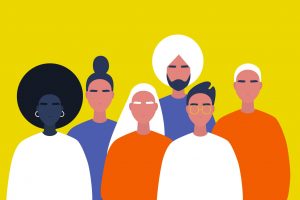Minority Mental Health Month: Awareness Without the Stigma

Bebe Moore Campbell National Minority Mental Health Awareness Month is observed each July as an opportunity to create mental health awareness in diverse communities and end the stigma associated with receiving mental health services and support.
Bebe Moore Campbell was an American author, journalist, teacher, and mental health advocate who worked tirelessly to shed light on the Black community’s mental health needs and other underrepresented communities. Today, Minority Mental Health Month may be seen written as BIPOC (Blacks, Indigenous People and People of Color) Mental Health Awareness Month.
Studies suggest that racial minority groups and sexual minority groups show higher levels of anxiety, depression, suicidal tendencies, post-traumatic stress disorder and other mental health disorders. Monarch’s Child and Adolescent Psychiatrist Dr. Jose Bogantes-Montero noted that there are a number of primary reasons minorities do not seek mental health services: “Language barriers, financial difficulties, lack of insurance, lack of time due to working more than one job and the fear of legal consequences such as deportation can all cause minorities not to seek the mental health services when in need.”
Ways Monarch Provides Mental Health Assistance
Monarch’s Behavioral Health Therapist Holli Patillo explained that Monarch addresses these disparities in several ways, including providing affordable mental health care to uninsured community members.
The U.S. Department of Health and Human Services Office of Minority Health reports that minorities are less likely to receive diagnosis and treatment for their mental illness. The report also says minorities have less access to mental health services and often receive a more reduced quality of mental health care.
“The Open Access program ensures that people we serve can access therapeutic services right away, as opposed to being on a waiting list for weeks or even months,” Patillo noted. “Monarch provides community-based services including In-Home Therapy Services, Intensive In-Home Services and Assertive Community Treatment Team in many counties across North Carolina.”
Patillo, who works primarily out of the SECU Youth Crisis Center in Charlotte, added that community-based services are useful in breaking down barriers such as transportation issues because the therapy team travels to the people we serve. “Monarch’s team does quite a bit of case management work as well, ensuring that people are connected to the services and resources they need the most,” she said.
Disparities in Minority Youth
These disparities not only apply to adults but youth as well. A report from 2017 indicated that Hispanic girls, grades 9-12, were 40 percent higher than for non-Hispanic, white girls in the same age group. African American females in the same classes were 70 percent more likely to attempt suicide. Suicide attempts for Adolescent American Indian/Alaska Native females, ages 15-19, have a death rate that is three times higher than for non-Hispanic, white females in the same age groups.
Dr. Jose Bogantes – Montero, who counsels people in need in Monarch’s Behavioral Health Wake office, shared that in general, Latinos are reluctant to receive assistance for their mental health needs, specifically individuals from older generations or anyone who may not have graduated from or high school.
“Younger generations might consider receiving treatment, but there is an inhered stigma that follows, or they need permission from parents,” said Dr. Bogantes – Montero. “In many cases, mental health problems are perceived as a sign of weakness.”
How to Get Involved in Minority Mental Health Awareness Month
One way to learn more about Minority Mental Health Month is to read educational resources. Find out more about trending mental health topics:
- How to Tell If Someone You Know is Depressed,
- Suicide Prevention and Warning Signs,
- Ways to Alleviate Stress and Anxiety During the Coronavirus Pandemic.
If you, or someone you know, needs mental health support, please call Monarch at (866) 272-7826, Monday through Friday, 8 a.m. – 5 p.m. For 24/7 support, call The National Suicide Prevention Lifeline at (800) 273-8255.
Posted on: Friday July 3, 2020
